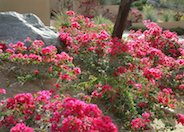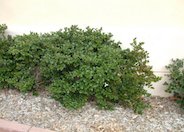
Common name:Bougainvillea, La Jolla
Botanical name:Bougainvillea 'La Jolla'
The large amount of flamboyant color on this species creates a wonderful accent in a garden. Varieties can be in bush or vine form; colors vary. Once established, they tend to be carefree. All varieties are susceptible to frost damage. 'La Jolla' blooms in bright red; it is a compact shrub and good for containers.

Common name:Royal Purple Smokebush
Botanical name:Cotinus coggygria 'Royal Purple'
Royal Purple Smokebrush is a large shrub with handsome, oval purple leaves all summer and silvery-purple clouds of seed heads in fall. It is subject to winter dieback. It is best in a protected location. It needs full sunlight. -Fort Collins Nursery

Common name:Tree Roses
Botanical name:Rosa Tree varieties
Tree roses are actually shrubs that have been grafted or grown in a way that looks like a tree, ie with a trunk. Tree roses can be floribundas, hybrid teas, or grandifloras. They are typically used as specimen plants. Make sure the plant is tied to a stake in case of strong winds.

Common name:Climbing Rose
Botanical name:Rosa Climbing varieties
With its dark green foliage and fragrant flowers with full and double blooms, this upright shrub is generally grown as a vine or pillar rose. Climbing varieties come in many colors.

Common name:Natal Plum
Botanical name:Carissa macrocarpa
The Natal Plum is a shrub that quickly reaches 2'-7' tall and 10' wide. Stems have thorns. The plant produces a milky sap that may cause allergenic reactions for some folks. Leaves are leathery, glossy and dark green. White, fragrant star shaped flowers bloom in spring, followed by egg shaped fruit that turns red when ripe. Fruit tastes like cranberries! This shrub takes little water once it's established and tolerates heat. It's great for barrier hedges.

Common name:Italian Cypress
Botanical name:Cupressus sempervirens 'Stricta'
Italian Cypress is often associated with Italian and Spanish architecture, providing columns in the landscape. They often reach 60' tall. 'Stricta' is compact, columnar and produces long, straight branches with deep green foliage.
Designer: Stephanie Blanc
Photographer: GardenSoft
Incorporate compost 6" into your soil to retain water, reduce compaction, feed earthworms, and provide valuable nutrients to your plants.
Attract, or buy beneficial insects such as ladybugs and lacewings to control pest outbreaks in your garden.